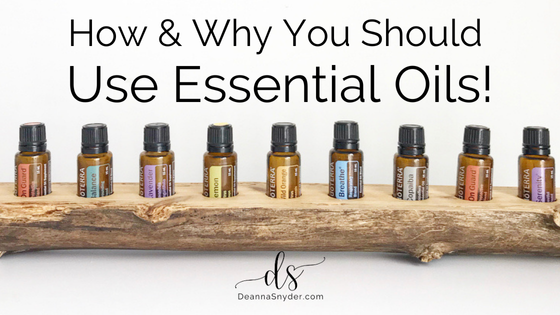How & Why You Should Use Essential Oils
Thursday September 9, 2021

How & Why You Should Use Essential Oils
I am essentially powered by plants, from what I eat to what I put on and in my body. Plants give me life! That's why I love essential oils! Essential oils are volatile aromatic compounds that support the body in maintaining optimal health and can be used daily. I like to think of essential oils as supplements, giving my body the daily nutrients it needs to function properly. Some days I need more, while other days I need less.
Keep in mind that essential oils are NOT created equally. Most essential oils are adulterated, meaning they are not what the label says and are often mixed with a cheaper synthetic alternative. This can cause harm to the body.
Adding certified pure tested grade essential oils into your daily routine can be natural and safe when you follow these considerations:
Quality. The oils you use matter. As the world leader of essential oils, doTERRA strives to ensure that only the highest quality oil is bottled for distribution. Using low-quality, altered, or synthetic essential oils dramatically increases the possibility of sensitivity or reactions and decreases the effectiveness of the oil. When using a potent, pure oil, only a small dose will be required to deliver significant benefits. We will talk more about the appropriate dosage below.
Dosage. Just as you shouldn't take more than the recommended dose of vitamins or minerals, essential oils are potent and a very small dose is more than sufficient. Whether used in a diffuser, on your skin, or in a Veggie Capsule, no more than a few drops are needed at a time. Less is more when it comes to essential oils!
Variety. Take a look at the many ways to use individual essential oils, and you'll see that many benefits are similar. However, changing up the oils you use rather than sticking to one or two can be beneficial, just like having variety in your diet. This also allows you to discover which oils work best with your body's chemistry for the benefits you want. Everyone is different. What works for me may not work for you and visa versa.
Dilution. Some oils are incredibly potent, like the phenols and aldehydes groups (Cassia, Oregano, to name a few). These are known as "hot oils" and should always be diluted. Dilution is an excellent method to use with any oil to increase the surface area and slow down absorption to prevent any possible sensitivities. My favorite way to use oils is to place them in a rollerball and it is so easy to apply. Especially on the go! Toss them in your bag and off you go.
Types of Carrier Oils:
Fractionated Coconut Oil. Coconut oil is high in antioxidants and Vitamin E. But, the thick, unrefined coconut oil you find at the grocery store is not as useful for aromatherapy purposes because it doesn't readily absorb into the skin. Fractionating coconut oil makes it ideal for aromatherapy. The process of fractionating coconut oil makes the fatty acid chains separate out and produces a liquid consistency. Nothing is added to the oil itself to make it this way. This gives the oil a much longer shelf life and creates an oil that is non-greasy, light, and better for absorption.
Sweet Almond Oil. Great for all skin types and topical applications, almond oil is absorbed by the skin fairly well. It does have a slightly nutty smell to it, but nothing overwhelming. It is a great oil to use in face care because it helps moisturize. Be aware, however, that it is not for those with nut allergies as it is often produced in the same factories as peanut oil.
Jojoba Oil. Despite being called an oil, jojoba (pronounced ho-ho-ba) is a liquid wax. Odorless and golden yellow, jojoba is another popular carrier oil because it is great for hair and leaves skin hydrated without a lot of heavy shine. It is very similar to the oil that your skin produces naturally and can be good for oily skin.
Grapeseed Oil. This oil is high in linoleic acid and is very moisturizing, especially for delicate skin. You'll often see it listed on the ingredients list of many cosmetics. Its aroma is light and sweet, and it is clear in color. It can be a good carrier oil to use for occasional blemishes.
Olive Oil. Though it can be heavy, oily, and have a stronger odor when compared to the others, the benefit of olive oil is that it is high in both vitamins and minerals. Depending on the quantity and how diluted you need the essential oil to be, olive oil can overpower the scent.
Age. Young children and the elderly will require special precautions when using essential oils. Their skin is typically more delicate and sensitive; in these cases, appropriate dilution modifications or essential oil substitutions for less strong oils (like Spearmint instead of Peppermint) can be made.
Feel free to contact me if you are interested in learning more about using natural solutions for you and your family.
While you are scrolling on social media, please hop on over to my Insta and Facebook pages this month. I'm sharing my favorite Roller Blend Recipes for easy application for optimal health and wellness.
Until the next time.
Be well, Deanna
Peace. Love. Oils.


